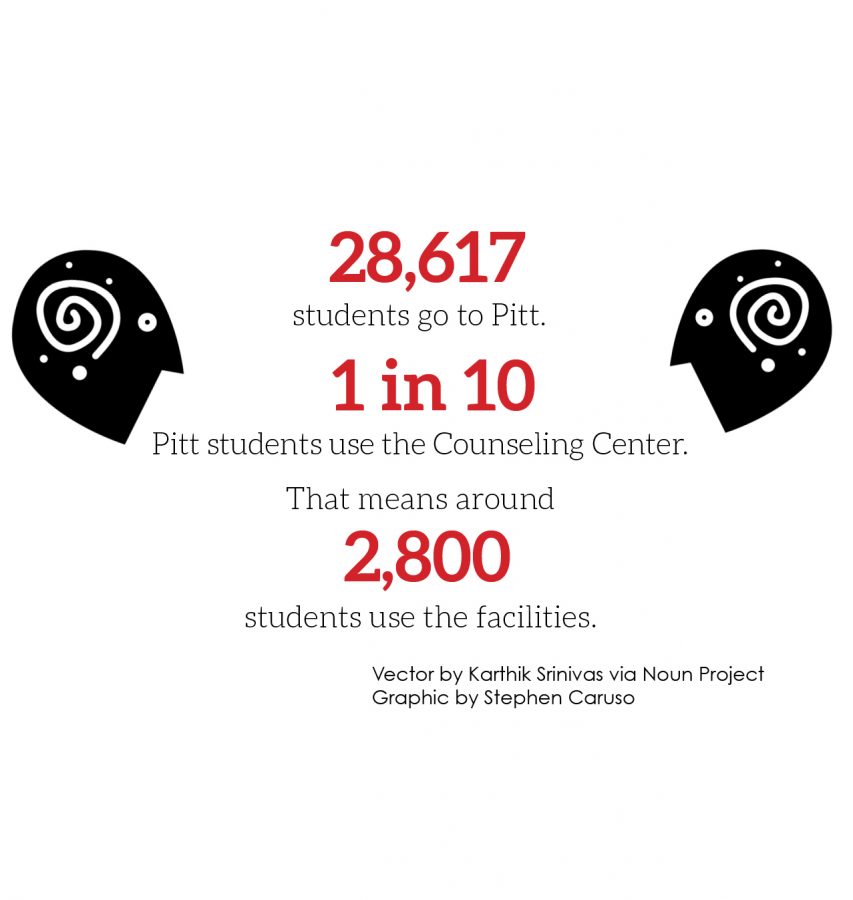A few weeks ago, I tried to make an appointment at Pitt’s Counseling Center only to be told that the counselors were so busy that it could be over a month before I could get an appointment.
I know Pitt is a large university with increasing mental health service demands, but I didn’t expect the wait to be so long.
When I called, the person I spoke with also told me that due to a new eight session limit on counseling appointments, the Center could not offer me enough appointments for the help I was seeking. Instead, I was recommended an off-campus therapist and emailed a list of references.
I initially made the call to the on-campus counseling center to find a therapist in a convenient location, at least for the time being. But luckily, reconnecting with a previous therapist was easy for me — a privilege that not all students have the money, time or insurance to take advantage of.
I found out I was not alone in my concern about a lack of psychiatric services at Pitt when I heard about a petition started by junior Anna Shaw. Last month, she said she had similar worries in a petition informing students that the only remaining psychiatrist at Pitt’s Counseling Center was leaving without a replacement. There are two positions currently open at the Counseling Center.
Shaw started the petition because Pitt currently has no licensed psychiatrists on staff who can treat students and fill prescriptions for mental health medications. The Counseling Center is planning, in accordance with recommendations from Pitt’s Mental Health Task Force, to offer 20 counselors, but none of them can prescribe medications.
Pitt’s Counseling Center has made recent changes in its services in order to accommodate more students. Beginning this semester, changes to the Counseling Center allow for each student to have up to eight sessions per academic year as a way for counselors to assist more people.
This semester, Pitt has a student population of 28,617, including graduate and professional schools. And according to the National Alliance on Mental Illness, one in four college students is diagnosed with a mental illness, meaning more than 7,100 students at Pitt may suffer from a mental illness. About 10 percent of students use the counseling center every year, according to Pitt spokespeople.
It is impossible for a staff this small to meet the mental health needs of a student body this large. Pitt’s Counseling Center is hiring additional staff to accommodate the increasing demand, but it might not be enough.
Although the Counseling Center is helping direct those who need medication to local services, not everyone has the ability to afford an off-campus psychiatrist. Students are rightfully upset by the fact that the University does not seem to be taking this seriously.
When our staff is overworked and fully booked, it reduces the time and quality of the treatment available for students. Due to the increasing need for services with fewer resources to accommodate these challenges, everyone suffers from the lack of proper treatment available. To set off-campus appointments, students, with Pitt’s help, must search for a therapist that specializes in what they need counseling in, and they must also have insurance and money for a co-pay.
I thought of students with anxiety and other conditions who would be told that the Counseling Center was too busy, but decide not to call one of the references. What were the chances that these students were going to do so? Receiving an email with a list of therapists and phone numbers felt like I was being shooed away.
At the very least, if the Counseling Center is going to deny students, it should take the initiative to make sure that the student seeking help gets that help they need. If the Center has to deny students or give them a long waiting period, it should check in with the student and make sure they are getting assistance in the meantime.
Once a counselor from Student Health Service emailed me references, there was no follow-up. This was concerning for other students who need help, are denied and then left to fend for themselves.
Students should not have to wait a month or more to receive help at their University nor should their treatment be limited to what they can afford off campus.
Student Affairs spokesperson Shawn Ahearn said the first psychiatrist left in May, and the second one just retired recently. Pitt has been searching to fill this position since the first left, but has yet to find a qualified candidate for the job.
Yet while the University has said it’s working to fill the two positions, the issue was not announced publicly until students complained about it and Shaw’s petition circulated around social media.
I’ve asked friends whether or not they had similar experiences with the Counseling Center, and was told by a few people that they were also dissatisfied with the time it took to make an appointment and the newly-instituted eight session limit.
These conversations left me unsettled because I realized I was not the only one with concerns. I thought of all the students in need that were being denied help because the Counseling Center was overbooked.
If Pitt is a university that supports and cares about students with mental health issues, it should be showing that this issue is a priority by making hiring a psychiatrist a priority, or at the very least, making its plans to hire someone more clear.
Otherwise, students are the ones bearing the burden of untreated mental illness.
Write to Erica at [email protected].


